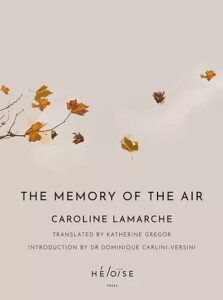I. Rape In French Contemporary Women’s Writing
In her seminal feminist manifesto, King Kong Theory (2007), Virginie Despentes describes rape as “a civil war, a political organization through which one gender declares to the other, I have complete power over you, I force you to feel inferior, guilty, and degraded.” In the essay, Despentes draws on her own experience of rape when she was a teenage girl to reflect on its impact on women. She deplores the erasure of rape in women’s writing, notably in French texts, and explains she found solace in American feminist writing when she was dealing with her own trauma:
Prison, illness, abuse, drugs, abandonment, deportation: all traumas have their literature. But this crucial and fundamental trauma—the very definition of femininity, “the body that can be taken by force and must remain defenseless”—was not part of literature. Not a single woman who has been through the process of rape has taken to words to craft a novel out of her experience. No guide, no companionship. Rape wasn’t allowed into the symbolic realm.
The textual erasure of rape Despentes refers to might point to the ambiguous status of rape in French feminism. Indeed, Kathryn Robson notes that rape has been a contentious point amongst feminists of the second wave “in France and elsewhere. French feminist movements were caught between defining women as, on the one hand, self-determining individuals with bodily autonomy and, on the other, (potential) victims of ever-threatening sexual violence in need of legal protection.” Although this tension divided second-wave feminist debates, the question of rape is central to the twenty-first-century feminist agenda according to Robson.
These texts show that women can be both victims and active agents in control of their stories.Indeed, Despentes’ assertion should be nuanced, as women have repeatedly explored rape in their writing since the 1990s. From supernatural tales such as Marie Darrieussecq’s Truismes (1996; English title: Pig Tales, 2005), to more realistic approaches such as Meryem Alaoui’s La Vérité sort de la bouche du cheval (2018; English title: Straight from the Horse’s Mouth, 2020), Nathacha Appanah’s Tropique de la violence (2017; English title: Tropic of Violence, 2020) or Virginie Lou’s Eloge de la lumière au temps des dinosaures (2001), rape can be considered a topos in contemporary women writing in French. Many women writers have also chosen to share their personal experience of sexual abuse in their writing, most notably in Christine Angot’s L’Inceste (1999; English title: Incest, 2017)—or her most recent exploration of the topic in Le Voyage dans l’Est (2021)—as well as of Samira Bellil’s Dans l’enfer des tournantes (2002; English title: To Hell and Back, 2008) and Vanessa Springora’s Le Consentement (2020; English title: Consent, 2021).
As I argued elsewhere, rape is omnipresent in Despentes’ non-fictional and fictional writing too. Francophone women writers have also written about rape after someone else experienced it. For instance, in La Robe blanche (2018; English title: The White Dress, 2020), Nathalie Léger narrates the story of Italian artist Pippa Bacca, who was raped and murdered during an art performance in Istanbul. Similarly, in La Familia grande (2021; English title: The Familia Grande, 2022), Camille Kouchner tells the story of the incest her twin brother suffered. These multiple accounts of rape from fictional narrators, actual victims or witnesses highlight the frequency—even the banality—of rape in women’s lives, but they also reveal the multiplicity of women’s experiences of rape whether they are fictional characters or not.
Thus, these literary explorations are a way to problematize the binary opposition that divided the second-wave feminist movement and that still structure some normative assumptions on gender violence. Indeed, these texts show that women can be both victims and active agents in control of their stories, consenting and raped, bearing witness and silenced at the same time.
Recently, the #MeToo movement has represented a transnational liberation of women’s words outside of the literary text. It showed the world that victims of sexual harassment and abuse could take back control of their own narratives, creating new models of agency for women. Although initiated in Hollywood, it encouraged women as well as gay men from different places and industries all over the world to share their experience of sexual violence. It contributed to the emergence of new forms of feminist online activism and care networks. At the same time, it gave more women the strength to put their stories in writing. In the French context, this is true of two texts I already mentioned, Springora’s Consent and Kouchner’s The Familia Grande.
The story of rape and trauma is also one of finding freedom and self-healing through solitude.In turn, literary texts can have the power to bring about positive change. Indeed, in her self-narrative Consent, Springora describes her sexual and romantic relationship with fifty-year-old Gabriel Matzneff when she was fourteen. The relationship took place during the 1980s in France, at a time when the rhetoric of sexual freedom inspired by May ’68 and the following years was still pervasive in the artistic world. Springora notes that their relationship and the many others Matzneff had with other teenage girls and boys were well known in Parisian literary circles and regularly featured in his books.
After the publication of Springora’s book in the post-#MeToo era, there was a widespread outcry and condemnation of Matzneff in the French and the international media alike. Matzneff lost a grant which he was still receiving from the Centre National Du Livre, a government body, and he has been shunned in literary circles. Some people who helped and protected him had to resign, notably Christophe Girard, who was in charge of culture in the Paris City Hall at the time. Most importantly, the text contributed to a broader discussion on consent in France, as observed by Elsa Court:
Three weeks after the publication of Le Consentement (Consent), a group of 30 representatives in the Assemblée nationale introduced a proposal for the age of consent be set at 15, citing Springora’s book: “How is it possible to acknowledge having been abused,” reads the passage quoted in the proposal, “when it’s impossible to deny having consented, having felt desire, for the very adult who was so eager to take advantage of you?”
Under French law the act of not saying no was understood as consenting (reminding us of the saying “qui ne dit mot consent,” in other words silence means consent), and the presumption of consent prevailed, even for an under-aged victim. Springora’s text and the discussion that followed its publication in the French Parliament led to a change in the law, which now recognizes the age of fifteen as the official age under which a person cannot be considered to be consenting.
Additionally, another victim of Matzneff’s, British journalist Francesca Gee, recently announced that she will be self-publishing her own account of the abuse she experienced at the hands of Matzneff. Gee submitted her manuscript to Vanessa Springora’s publisher in 2004, but she was told at the time that people were not ready to hear her story. Thus, Springora’s narrative of sexual and psychological abuse led to the empowerment of women collectively and individually.
II. The Memory of the Air: From The Intimate to the Universal
Reading Caroline Lamarche’s The Memory of the Air, which was initially published in 2014, in the pre-#MeToo era, is a fascinating experience, as Lamarche’s original text prefigured the movement, while the English edition, published in the post-#MeToo era, revives it. The narrative is an oneiric exploration of the various forms of violence exerted on women through a subtle portrayal of domestic abuse and rape. Indeed, in The Memory of the Air, rape haunts the narrator, but its description only appears late in the text. The haunting is evoked poetically in the form of a dream that the narrator keeps having, the depiction of which opens the text:
Last night I dreamt that, risking my life, I went down into a ravine and, at the bottom, found a dead woman. She was lying in a shroud, on a carpet of fallen leaves. I lifted the white sheet and saw her face, her closed eyes. She had rosy cheeks, a beautiful complexion, and didn’t look her age, which—of that I was certain—was the same as mine: I hope I die before I become old.
The first-person monologue uncovers the victim part of the self, as the reader gradually understands who the dead woman is. Like many texts dealing with gender violence, it is based on the writer’s experience. Caroline Lamarche evoked the personal dimension of the narrative, describing the text as: “a universal story, a sort of exemplary story and yet it’s mine.” Indeed, various textual strategies contribute to confer a universal dimension to Lamarche’s words.
The use of the first person and the anonymity of the narrator are ways to immerse the reader in the story as well as to foster a sense of proximity between narrator and reader. In addition, the restrained and elliptical quality of Lamarche’s writing, which only reveals fractions of the narrator’s story, actively engages the reader in uncovering it, and in that way, makes her or him a part of the story.
The Memory of the Air is a striking testimony of the power of words and of their importance in our individual and collective understanding of, and dealing with, sexual violence.The universal appeal of the text can also be read in its political engagement. Although the text is neither militant nor overtly political, it displays a will to “donne[r] la parole à une narratrice qui tente d’échapper aux codes sociaux régissant l’amour, la violence conjugale et le viol” (“give a voice to a narrator who is trying to escape the social codes governing love, domestic violence and rape,” my translation). The text subtly addresses the question of the victimization of women who have experienced rape. Through the process of anamnesis, it deals with the guilt that the narrator has repressed, a guilt she is made to feel by male protagonists.
Firstly, Manfore, the man with whom she was in a toxic relationship for several years. Lamarche speaks of “a war between sexes” to describe their relationship, which is both passionate and psychologically and physically violent. Manfore frequently engages in gaslighting and, on one such occasion, attempts to justify his own brutality by accusing her of being violent to him because she has been raped: “You were raped a few years ago, weren’t you? […] You’ve never processed that rape, that’s why you see violence everywhere, when you’re the one who’s violent because of that unprocessed rape.”
The narrator is similarly shamed by the police for potentially experiencing pleasure when she was raped when she goes to them for assistance. As police officers take her statement, one of them asks her whether she had an orgasm on the pretext that “We need to know for the investigation.” The confusion of her reply “Yes-no-I-don’t-know” is met by an intimation to be silent about it, or to risk losing her trial, which plunges the narrator into anxiety as she imagines being questioned and challenged at the trial. By attempting to shame and silence the narrator, the police institution constitutes another form of control of the female body in the text. Albeit less brutal than the various forms of physical violence the narrator experiences, this institutional violence nevertheless leaves a mark on the narrator, and furthers her trauma.
III. On The Importance of Testimony
In Lamarche’s text, the narrator’s attempt to tell her story to the police is perceived as a second violation, which mirrors many rape victims’ experiences. Zoe Brigley Thompson and Sorcha Gunne note that this risk exists in literary and other artistic representations of rape too, in which the rape can be appropriated as an object of consumption. At the same time, they emphasize the importance of literary and visual accounts of rape to subvert assumptions on sexual violence, adding that “[t]hese reconfigurations of rape narratives are important as feminism(s) attempts to move beyond the victim/perpetrator binary.” Lamarche’s text certainly offers such a reconfiguration.
Through her writing, the narrator slowly discovers herself and finds a way to reconcile with the dead woman in the ravine. Although it is only alluded to, the reader witnesses the narrator’s rejection of traditional gender roles and of heterosexual relationships. Hence, the story of rape and trauma is also one of finding freedom and self-healing through solitude. Lamarche sees her narrator as both “solitaire et reliée. Elle est sortie d’histoires de couple qui l’assujettissent, elle est mue par une histoire qui est la sienne” (“solitary and connected. She got herself out of relationships that subjugate her, she is moved by her own story,” my translation).
The semi-autobiographical dimension of the narrative means that this healing process is also Lamarche’s, who claims that: “Je ne me laisserai plus jamais dire que je suis inadequate lorsque je suis victime d’un abus de pouvoir” (“Never again will I be told that I am inadequate when I am the victim of a power abuse,” my translation). Indeed, The Memory of the Air is a striking testimony of the power of words and of their importance in our individual and collective understanding of, and dealing with, sexual violence. It is also a poetic encounter between the reader and a rich and complex female subjectivity. Today more than ever, voices such as Lamarche’s narrator need to be heard, and Katherine Gregor’s translation of The Memory of the Air is a timely contribution that brings this important voice into the Anglophone world.
__________________________________

Excerpted from The Memory of the Air by Caroline Lamarche, translated by Katherine Gregor, introduction by Dr. Dominique Carlini-Versini. Copyright © 2022. Available from Héloïse Press.


